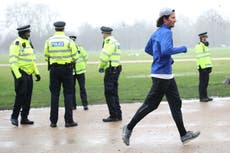How will people behave when the pandemic is over?
Some said they would avoid office cutlery and crockery, should they eventually return to the office

Your support helps us to tell the story
From reproductive rights to climate change to Big Tech, The Independent is on the ground when the story is developing. Whether it's investigating the financials of Elon Musk's pro-Trump PAC or producing our latest documentary, 'The A Word', which shines a light on the American women fighting for reproductive rights, we know how important it is to parse out the facts from the messaging.
At such a critical moment in US history, we need reporters on the ground. Your donation allows us to keep sending journalists to speak to both sides of the story.
The Independent is trusted by Americans across the entire political spectrum. And unlike many other quality news outlets, we choose not to lock Americans out of our reporting and analysis with paywalls. We believe quality journalism should be available to everyone, paid for by those who can afford it.
Your support makes all the difference.Millions of adults believe they will never again share a drink, snog a stranger, or try on someone else’s glasses once the pandemic is in the past.
A survey of 2,000 adults found moving forward, most will consciously try not to share items with other people and always maintain a social distance from those they don’t know.
One quarter of adults admitted they won’t reach into someone else’s crisp bag for a handful and a several others will no longer sneak a bite out of someone else’s sandwich.
Using make-up samples in a store, borrowing someone else’s lip balm and standing close to someone in a queue are also things Britons will avoid.
Meanwhile a small percentage of respondents said the couldn’t see themselves surrounded by others in a busy pub again even after all restrictions are lifted, and others said they intend to avoid buffet style restaurants at all costs.
Rebecca Strauss, from Vision Direct, which commissioned the research, said: “Habits such as carrying hand sanitiser everywhere, working from home when we have a cold, and washing our hands any time we touch our faces or eyes are positive habits we can continue to practice after the pandemic.
“We have always stressed the importance of good hygiene and handwashing in regards to eye health.
“But the pandemic has really opened our eyes to how these habits should be carried into other aspects of our lives.”
The survey revealed that some adults have no intention of using office cutlery in the future, assuming they return to the workplace eventually.
Similarly, some won’t use mugs or glasses in the office, and a handful say they will steer clear of the office tea round, ‘just in case’.
It also emerged people are more wary of others than ever before, with some saying they won’t chat to someone in close proximity in a club, won’t shake someone’s hand and will avoid sitting next to others on public transport.
Four in 10 adults polled via OnePoll said that going forward, they will be comfortable refusing a hug from someone, if they felt it inappropriate.
These findings are despite one third of adults claiming they are usually tactile, touchy feely people.
And Britons are agreed it will take an average of a year following lockdown lifting, and the vaccine being rolled out to all adults, before life will start to feel anything like ‘normal’ again.
SWNS



Join our commenting forum
Join thought-provoking conversations, follow other Independent readers and see their replies
Comments